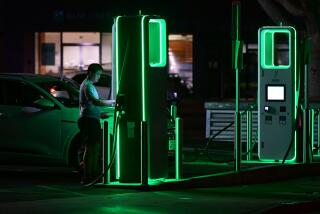Clunkers still keeping dealers busy
- Share via
Auto dealers found themselves in an unusual situation over the weekend: crowds of anxious buyers and a dwindling supply of cars.
The overwhelmingly popular $1-billion federal effort to stimulate auto sales gave dealers another busy weekend, capping nine days of activity they hadn’t seen in a long time. And the “cash for clunkers” program will continue for at least two more days.
Transportation Secretary Ray LaHood said Sunday that the federal government would continue reimbursing dealers through Tuesday as the Obama administration works with the Senate to provide an additional $2 billion for the Car Allowance Rebate System program, known as CARS. The House passed the measure Friday.
“We’re going to work very hard with the Senate on this,” LaHood said in an interview on C-SPAN. “Our commitment is to make sure that car buyers and dealers are reimbursed.”
The program nearly ran out of its allotted $1 billion in the first six days, and LaHood said it wouldn’t last through this week if the Senate didn’t agree to appropriate more funds.
Monthly auto sales to be reported today should indicate just how popular the program has been. Ford Motor Co. expects to report a year-over-year jump in monthly sales -- the first such increase in about two years.
Although some dealers have been confused about calculating rebates and frustrated over slow government processing of reimbursements, they are glad for the business.
“I’ve been here 15 years, and I’ve never seen it like this,” said Rudy Velasquez, a salesman at Cerritos Dodge Chrysler Jeep. Chrysler is doubling the government’s offer of $3,500 or $4,500 discounts, giving consumers $9,000 off some new cars.
The Dodge dealership ran out of Jeep Patriots and Compasses in the first few days of the program, Velasquez said, and has only one PT Cruiser and one Dodge Caliber left. Salesmen stayed until 2 a.m. Sunday to finish closing Saturday deals, he said.
“There was an urgency that the money was going to run out,” Velasquez said.
Cindy and Stan Hanenburg pounded the pavement all weekend looking to replace their 1998 GMC Safari. The air-conditioning unit had broken down, and the Whittier couple decided to take advantage of the CARS program, moving quickly after hearing it might end.
“They’re all saying it’s going to run out,” Cindy Hanenburg said as she waited impatiently for a Honda salesman at Cerritos Auto Square to tell her whether he could give her the price she wanted on an Accord. “We don’t want to miss out.”
Such urgency meant a headache for dealers trying to make a sale. Several reported that the government’s website for processing the rebates kept crashing, making it difficult to file the necessary paperwork.
Gerardo Dorantes, finance manager of LaMar Hyundai in Cerritos, said it could take three to four hours to process the paperwork for each car. He was planning on returning to the dealership in the middle of the night to upload the information, hoping there would be less traffic on the website.
“Sales have been excellent,” he said. “But getting on the website -- that’s the hard part.”
LaMar was low on inventory because it had planned to move to a new site long before the cash-for-clunkers program was announced, Dorantes said. Otherwise the dealership could have doubled its sales, he said.
Ty Elkin, sales manager at Commerce Hyundai, said it was sometimes difficult to close a deal because customers were too rushed. They had wanted to buy before cash-for-clunkers money ran out, he said, and many didn’t take the time to be sure they had the documents they needed to trade in their cars.
Other customers hadn’t insured their cars for a full year, meaning they didn’t qualify for the program, said Gary Guemiksizian, sales manager at Toyota of Glendale.
Customers said some dealers were confused about adding sales tax before or after the rebate was deducted, and they charged more than they should have. California tax authorities have said the tax should be assessed on the discounted price.
Other shoppers said that because the government’s list of qualifying cars appears to be changing, they weren’t sure if they could get a new car.
Wayne Hunt traded in his 1998 Dodge Ram for a new Ford F-150 two weeks ago. At the time, neither car qualified for the cash-for-clunkers program. A week later, he saw on the government database that he could have traded in his car for a $4,500 discount.
The CARS rules, he found, allowed the discount to be applied retroactively, but his Ford dealer said it couldn’t change the price. The Cummings, Ga., resident now is pressing his case with federal lawmakers and the White House.
Still, confusion and crowds didn’t deter customers from shopping. Norm Reeves Honda Superstore in Cerritos sold 113 vehicles over the weekend. Cerritos Dodge averaged 16 cars a day this weekend -- usually it sells seven or eight cars a day. And Toyota of Glendale sold 25 cars a day this weekend, up from the typical 10 to 15 a day.
George Pipas, Ford’s U.S. sales analyst, said the carmaker sold more cars last month than it did in July 2008, giving Ford its first year-over-year sales increase in nearly two years.
“A week before cash for clunkers, this month didn’t look all that different from last month,” he said. “But as soon as cash-for-clunkers legislation took effect, sales really surged.”
And service could suffer.
On Sunday morning, John and Amber Rapp wandered the Cerritos Dodge lot, gazing into the windows of trucks with “$4,500 Rebate” written in fluorescent yellow on the window.
They wanted to trade in their 1998 Pathfinder for a new truck but weren’t sure if they qualified. When no salesperson approached them, they continued to wander, not knowing whether they would drive away in a new car.
“No one is helping us,” Amber Rapp said. “I guess we’ll just keep going from lot to lot.”
--







